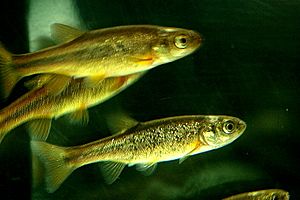Lake minnow facts for kids
Quick facts for kids Lake minnow |
|
|---|---|
 |
|
| Conservation status | |
| Scientific classification |
|
| Kingdom: | Animalia |
| Phylum: | Chordata |
| Class: | Actinopterygii |
| Order: | Cypriniformes |
| Family: | Leuciscidae |
| Subfamily: | Pseudaspininae |
| Genus: | Rhynchocypris |
| Species: |
R. percnurus
|
| Binomial name | |
| Rhynchocypris percnurus (Pallas, 1814)
|
|
| Script error: The function "autoWithCaption" does not exist. | |
| Synonyms | |
|
|
Script error: No such module "Check for conflicting parameters".
The lake minnow or swamp minnow (Rhynchocypris percnurus) is a small, freshwater fish. It belongs to the cyprinid family, which includes carps and minnows. This fish lives in lakes, slow-moving rivers, and swamps across parts of Europe and Asia.
Lake minnows are known for being quite small. They usually grow up to about 18.5 centimeters (around 7 inches) long. They are an important part of the food chain in their habitats.
Contents
What is a Lake Minnow?
The lake minnow is a type of minnow. Minnows are generally small, silvery fish. They often live in groups called schools. This helps them stay safe from bigger fish and birds that might want to eat them. Lake minnows are also sometimes called swamp minnows. This name comes from the kinds of places they like to live.
Where Does the Lake Minnow Live?
The lake minnow has a very wide range, but its populations are spread out. This means you won't find them everywhere in between. They live in both Europe and Asia.
European Homes
In Europe, you can find lake minnows in countries like Belarus, the Czech Republic, Germany, Lithuania, Poland, Russia, and Ukraine. They prefer cooler waters in these regions.
Asian Homes
Across Asia, their habitat stretches into northern China, Japan, Korea, and Siberia. This shows how adaptable these small fish are to different environments. They can live in many types of freshwater bodies.
What Does the Lake Minnow Look Like?
Lake minnows are typically slender fish. They have a streamlined body shape. This helps them swim quickly through the water. Their scales are usually small. Their color can vary a bit depending on their habitat. They often have a brownish or olive-green back. Their sides might be silvery, and their belly is lighter. They have fins that help them balance and move.
Life Cycle and Reproduction
Like most fish, lake minnows start their lives as eggs. The female fish lays many tiny eggs. These eggs are usually laid in shallow, calm waters. They might attach to plants or rocks. After a short time, the eggs hatch into tiny fish called fry.
The fry are very small and vulnerable. They feed on tiny organisms in the water. As they grow, they develop into juvenile fish. They then become adults. Adult lake minnows are ready to reproduce themselves. This cycle continues, helping new generations of minnows thrive.
Conservation Status
The lake minnow is currently listed as "Least Concern" (LC) by the IUCN. This means that, for now, their populations are stable. They are not considered to be at high risk of extinction. However, it's always important to protect freshwater habitats. This helps ensure that all fish species, including the lake minnow, can continue to live and thrive. Protecting their homes means keeping rivers, lakes, and swamps clean and healthy.
See also
 In Spanish: Rhynchocypris percnurus para niños
In Spanish: Rhynchocypris percnurus para niños
 | Bayard Rustin |
 | Jeannette Carter |
 | Jeremiah A. Brown |


